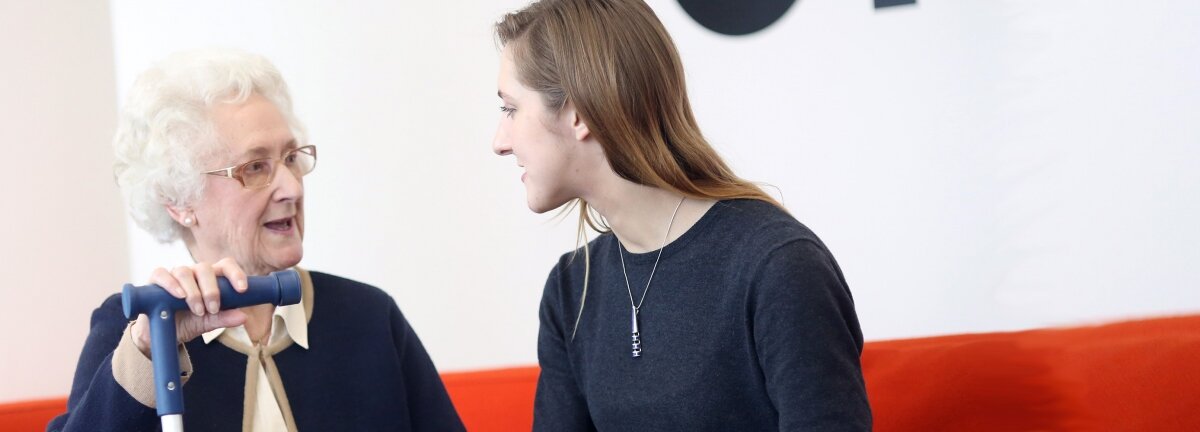MedTechSouthEast finalist wins £35,000 Nesta funding

MedTechSouthEast finalist, Cara O’Sullivan has been awarded second prize and £35,000 for her Evolvable Walking Aid in Nesta’s Inclusive Technology Prize.
In November 2015, inventor Cara O'Sullivan was one of ten finalists in Design Council's MedTechSouthEast competition. Together with AXA PPP healthcare and MedCity, we were seeking out the next generation of user-centred, non-invasive medical technology from the exceptional pool of innovation talent in the south-east of England.
Since then, Cara and her team have enjoyed the intensive accelerator programme led by our design experts and medtech industry leaders. The programme has given them a practical understanding of how to use design to fast-track the commercialisation of their innovation, including how to better plan, prototype and effectively communicate their product, maximising impact and managing risks.
She is now enjoying even more success, having a been recognised by Nesta's Inclusive Technology Prize. This competition, which showcases assisted living technology and had more than 200 entrants, awarded ten finalists £10,000 and the chance to receive support from the Challenge Prize Centre to improve and refine their products. Cara and her team, as the recipients of the Special Recognition Award, received £35,000 to further develop their popular product.
Cara, along with industrial designers from Brunel University London, Dot Wheeler and Katey Fitton, has developed the Evolvable Walking Aid over the last two years. The kit comprises a modular range of parts which can be assembled to form a walking stick, crutches, a walking frame, or variations of these aids. It saves the user from having to buy a new walking aid when their mobility condition changes – be it improving, degenerating, or simply if the user grows.
Cara first gained an interest in inclusive design during her Industrial Design and Technology degree at Brunel, when she interned at medical engineering charity MERU. “After seeing the types of equipment patients were using in mobility rehabilitation centres, I realised many walking aids shared the same components but were just put together in different ways. So for my final year project, I invented an adaptable wooden walking aid kit to provide affordable mobility equipment for people living in poverty in developing regions of the world. The Evolvable Walking Aid is essentially the offspring of that project,” said Cara.
Living with her grandfather as he progressively lost mobility was another inspiration for Cara's invention. “He started off using a stick, then transitioned to crutches and then a frame as he became less able to walk,” she said. “Buying the different walking aids had a big financial impact, and I could also see that having to get used to a new device each time had a big impact on his confidence as well. For people getting older or going through rehabilitation, that tends to be the way it goes – you are either getting better or getting worse, and that means the type of walking aid you need changes.”
In the UK alone there are over 4.3 million walking aid users and many require more than one aid as their condition changes. With so many different types of walking aids out there, Cara spoke to physiotherapists to learn which types of walking aids are most commonly used. She created a minimum viable product that could be adapted into each of these and easily used by community-based physiotherapists on home visits, too. “It’s a bit like a Lego kit in that sense,” said Cara. “The locking mechanism is the same as typical walking aids so it’s easy to learn how to assemble.”
The plan now is to introduce the Evolvable Walking Aid to users through physiotherapists who can use it as an assessment tool and prescribe it to patients. Once patients know how to use it correctly they can buy new parts themselves, from mobility shops or from the online platform which Cara plans to set up in the future.
Another differentiator for Cara’s product is the way that it looks. Feedback from user testing showed that people wanted more stylish aids, instead of the “dull grey ones” that are typically supplied. “We’d like to give walking aid users more control and choice,” she said, “instead of just having to put up with a standard product." The team plans to make the Evolvable Walking Aid available in a variety of colour options so users can mix and match to make a walking aid that best suits them.
The team has begun development of an extremely low-cost version of the Evolvable Walking Aid kit for developing regions of the world. Cara explained: “We were at the Big Bang Fair last week teaching young students about 'Designing for the other 90%' and testing out our visual instructions in advance of our trip to Uganda in April. We are going to teach locals how to make their own walking aids from recycled pallet wood and cable ties.”
Subscribe to our newsletter
Want to keep up with the latest from the Design Council?
